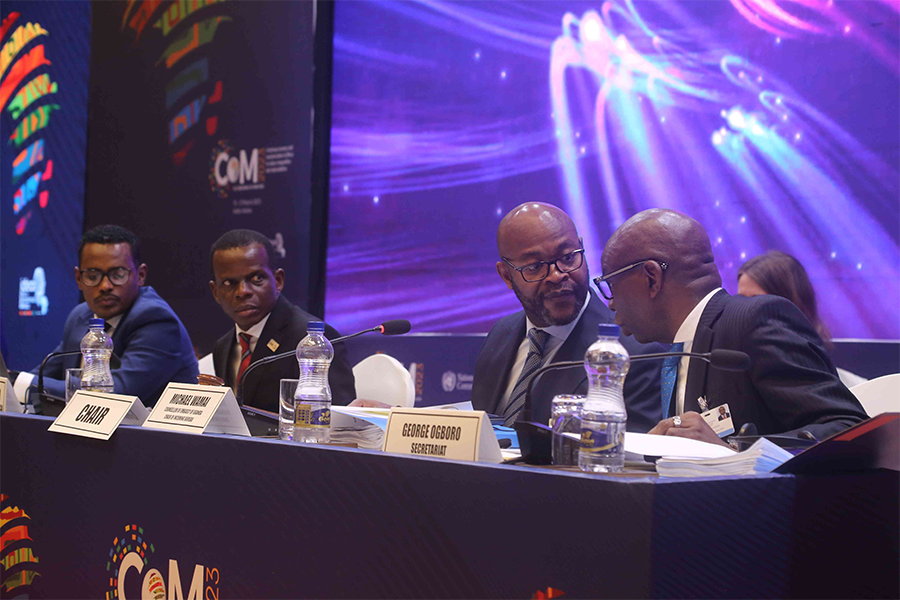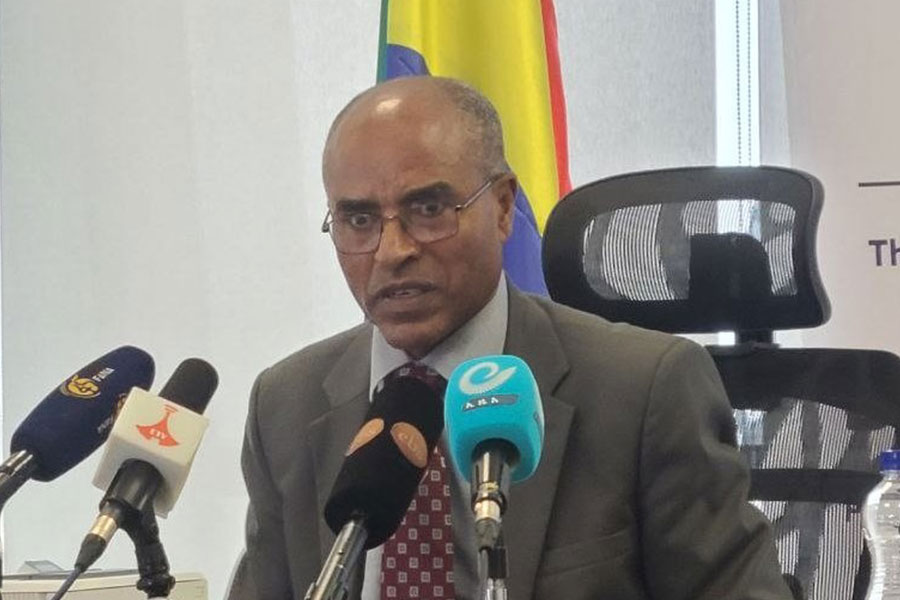
Viewpoints | Nov 23,2024
Nov 26 , 2022
By Hippolyte Fofack
A robust global carbon market would promote transparency and encourage decarbonization. Multilateral development banks’ ability to leverage their financial resources to support a liquid secondary market in developing-country sovereign bonds is essential to putting African economies on a path to sustainable development, writes Hippolyte Fofack, a chief economist and research director for the African Export-Import Bank (Afreximbank). Project Syndicate has provided this commentary.
The global conference on climate change in Egypt looks to be a defining moment in what will surely be a pivotal decade for climate action. Whereas the conference of parties (COP) in Glasgow last year was dubbed the “finance COP,” some have called it the “implementation COP” to reflect its focus on translating funding commitments into concrete plans.
The agenda underscores the need for stronger multilateral cooperation. It highlighted the urgency of honouring the international community’s pledge to close climate-financing gaps in the Global South. Failing to do so will make it challenging to meet the 2015 Paris climate agreement’s central goal of limiting global warming to below two degrees Celsius relative to pre-industrial levels. It will make the efforts to limit the temperature increase to 1.5°c impossible.
Converting financial commitments to investment opportunities is critical to strengthening African climate resilience. While the continent faces the quadruple threat of climate change, disease outbreaks, food insecurity, and political instability, African countries also struggle with enormous budget pressures that impede large-scale investment in economic development. If funding gaps go unaddressed, they will continue to undermine the continent’s opportunity to leapfrog the need for carbon-intensive technologies for progress in achieving the UN’s Sustainable Development Goals (SDGs) and hamper efforts to avert climate catastrophe.
The consequences will be felt far beyond Africa’s borders.
According to recent Climate Policy Initiative estimates, the global climate-financing gap – the difference between the total cost of combined Nationally Determined Contributions under the Paris climate agreement and the financing that governments can provide from their resources to support the net-zero transition until 2030 – is roughly 2.5 trillion dollars. Climate adaptation programs' funding lags behind investment in mitigation measures, despite the Paris climate agreement’s emphasis on balancing the two.
But Africa’s budget shortfall also reflects the structural problems of its economies. In particular, energy poverty has historically undermined economic diversification and exposed the region to adverse global shocks. The continent’s climate-funding gap amounts to 10pc of its combined 2.4 trillion dollars in GDP – more than double its annual spending on health and social programs – as chronic deficits have constrained governments' ability to expand public investment and attract private capital.
In 2018, the International Monetary Fund (IMF) highlighted the myriad challenges facing Sub-Saharan African countries in closing the financing gap, including the need to broaden the tax base to increase the capacity of governments to mobilize more revenues domestically. While significant progress has been made over the last two decades, the region’s performance remains dismal. Africa’s median revenue-to-GDP ratio is 20pc, compared to 28pc in East Asia and 42.3pc in Europe.
The financing gap has been magnified by the incidence of sovereign debt, which reflects destructive “perception premiums” – the overinflated risks that credit-rating agencies assign to African countries, irrespective of these countries’ macroeconomic improvements or growth prospects. With the spreads between African sovereign bonds and US Treasuries now in the double digits, debt-service payments have become African governments’ most significant expenditure. Interest payments are expected to consume more than 45pc of Egypt’s government revenues this fiscal year and swallow up over half of the government revenues in Ghana and Sri Lanka.
While elevated interest rates deter investment by setting unrealistically high return expectations, they also directly affect public spending. Financing gaps tend to cloud countries’ development horizons, with urgent short-term needs crowding out the most important long-term investments required to transform economies and expand opportunities for the benefit of future generations. Honouring external debt commitments, for example, will always trump funding climate-resilient infrastructure projects.
But in a world awash with cash, countries should not have to choose between saving the planet and preserving their access to capital markets. At 210 trillion dollars, global financial assets are worth roughly double the world GDP. An inclusive framework that fosters multilateral cooperation between key stakeholders and promotes innovative financing mechanisms could de-risk investment to catalyse private-sector financing. Such a framework must also improve the global distribution of green financing, which has been heavily skewed toward developed economies.
In the first half of 2021, high-income countries issued 76pc of the world’s green bonds.
Policymakers and multilateral development banks can help de-risk green infrastructure investment by encouraging innovative financing instruments such as guarantees, insurance, blended finance, and credit-enhanced bonds. Attracting more banks and institutional investors would raise Africa’s share of global climate financing, which is currently 5.5pc. Policymakers could increase that share by insuring investors against specific hazards and reducing the risk of losses.
Similarly, offering credit protection and extending loan maturities would help leverage more private capital to develop long-term green infrastructure projects.
Donors and multilateral lenders have a crucial role in mitigating overinflated risk perceptions and creating incentives for investors to finance green projects in developing economies. These stakeholders could create first-loss positions to improve portfolio ratings and de-risk projects through concessional funds employed for blended finance and grants. As more investors enter the climate-debt market, multilateral institutions could also enhance the credit of green bonds, thus raising risk appetites and channelling patient capital to where it is most needed.
A robust global carbon market would promote transparency and encourage decarbonization. Likewise, multilateral development banks’ ability to leverage their financial resources to support a liquid secondary market in developing-country sovereign bonds is essential to putting African economies on a path to sustainable development.
The burgeoning green-bond market has entered a virtuous growth cycle and is fast approaching the long-awaited milestone of one trillion dollars in annual green investment. But to encourage equitable climate finance, investors must avoid the stigmas that have long overwhelmed the fixed-income market, where foreign investors shun Africa or invest only at exceedingly high premiums.
Unbiased financing is crucial to winning the global battle against climate change. We must encourage asset managers to lead the charge to ensure sustainable development.
PUBLISHED ON
Nov 26,2022 [ VOL
23 , NO
1178]


Commentaries | Apr 30,2022


Radar | Mar 18,2023

Commentaries | Oct 22,2022

Fortune News | Apr 23,2025

My Opinion | 132272 Views | Aug 14,2021

My Opinion | 128692 Views | Aug 21,2021

My Opinion | 126600 Views | Sep 10,2021

My Opinion | 124206 Views | Aug 07,2021





Dec 22 , 2024 . By TIZITA SHEWAFERAW
Charged with transforming colossal state-owned enterprises into modern and competitiv...

Aug 18 , 2024 . By AKSAH ITALO
Although predictable Yonas Zerihun's job in the ride-hailing service is not immune to...

Jul 28 , 2024 . By TIZITA SHEWAFERAW
Unhabitual, perhaps too many, Samuel Gebreyohannes, 38, used to occasionally enjoy a couple of beers at breakfast. However, he recently swit...

Jul 13 , 2024 . By AKSAH ITALO
Investors who rely on tractors, trucks, and field vehicles for commuting, transporting commodities, and f...

Jul 12 , 2025
Political leaders and their policy advisors often promise great leaps forward, yet th...

Jul 5 , 2025
Six years ago, Ethiopia was the darling of international liberal commentators. A year...

Jun 28 , 2025
Meseret Damtie, the assertive auditor general, has never been shy about naming names...

Jun 21 , 2025
A well-worn adage says, “Budget is not destiny, but it is direction.” Examining t...

Jul 13 , 2025 . By YITBAREK GETACHEW
The Addis Abeba City Revenue Bureau has introduced a new directive set to reshape how...

Jul 13 , 2025 . By BEZAWIT HULUAGER
Addis Abeba has approved a record 350 billion Br budget for the 2025/26 fiscal year,...

Jul 13 , 2025 . By RUTH BERHANU
The Addis Abeba Revenue Bureau has scrapped a value-added tax (VAT) on unprocessed ve...

Jul 13 , 2025 . By NAHOM AYELE
Federal lawmakers have finally brought closure to a protracted and contentious tax de...